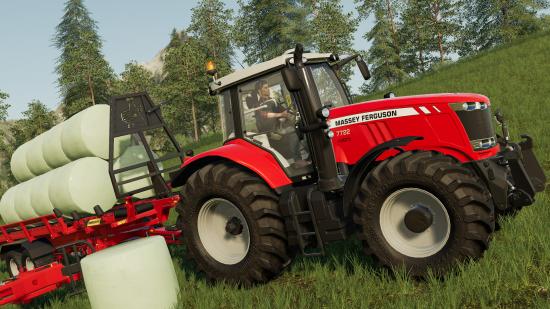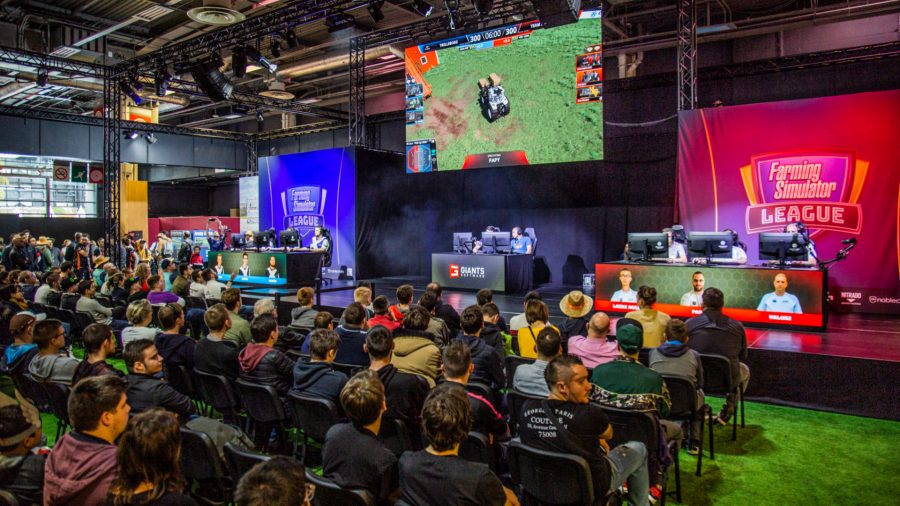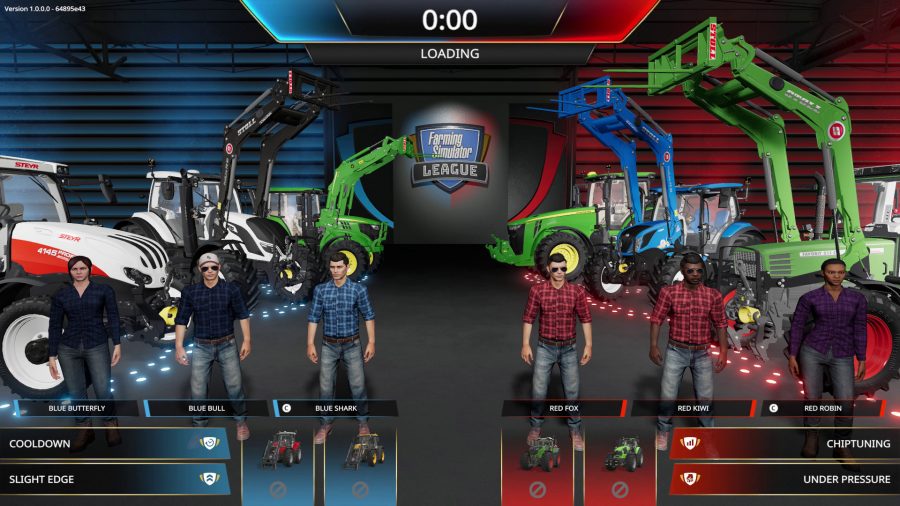Watching two bales of hay get stuck at the top of a conveyor belt before they can fall into the barn doesn’t sound like the kind of high intensity highlight you would expect to see in the world of esports, but somehow Giants Software has turned that exact situation into one of the most nail biting moments you will ever see.
Farming Simulator is not a game that instantly screams esports, in fact in the list of games that would make great esports you’d probably put Farming Sim pretty far down. But the new Farming Simulator League has proven that with some good planning and a new game mode designed for competition even the most mundane sounding activities can get a crowd excited.
“You are right, it’s not screaming [esports], but I think we’ve shown in the past few months, that any game can become a competitive spectator sport,” Christoph Stumpfer, community coordinator at Giants Software, says. “For us, it started out with our community. Fans started using the multiplayer functionality to stage their own competitive events. Bale stacking became our basis for the Farming Simulator Championship and we got really good feedback from that. People were into it. The first booth at Agritechnica 2017 was packed full. So for us, it was only logical to ask ‘Okay, but can we make this more awesome?’”
The result of that conversation was the Farming Simulator League, a series of events that sees teams of three compete against each other in a race to get the most points. Producing bales of hay by combining, baling, and storing them in a barn gives you points, but depositing grain into a silo at the other end of the farm increases your multiplier and decreases your opponents, making each bale worth considerably more. This invariably means matches come down to the final few seconds of, where one simple mistake can cost a team dearly.
“It took us a few months to go from the championship rule set to the rough format you can see today,” says Stumpfer. “In the beginning, we also thought about doing horse racing instead, but the focus around agricultural machinery is an important point, and [it] also let us do something really crazy. Our game is comparatively slow, when you look at other esports titles – a lot of them put emphasis on reflexes and plays. So, part of the reason the FSL looks like it does now was us asking ourselves: How do we make this more interesting to watch? What should spectators root for at this moment? What should players focus on?”
One issue that the rule set presented was that while the final stages of each match was almost always entertaining, the early and mid game felt a little lacklustre. Players quickly realised that it was pretty effective to spend the first half of the 15 minute match making as many bales as possible, before switching roles and trying to get them into the barn in the later stages. So all fans had to look at for the first five minutes or so were two teams doing exactly the same thing.
To counter this, Giants Software created the rush rule. Initially if a team managed to claim three of the same type of vehicle from the start they would instantly win the match. Teams have to race from their start position to grab the vehicles they want, because if the other team gets their corresponding vehicle first it is locked for the rest of the match. So if one team claimed all three combine harvesters, before the other team could, the game would be over.
Related: What are the biggest esports games of 2019?
On paper this sounds like a decent solution; it added excitement to the early stage of the game and created a massive risk reward option for teams to try. But when the first tournament took place, the best of three final, the only BO3 to be played that weekend, ended in seconds thanks to this rule. It was underwhelming to say the least. Something needed to be tweaked.
“[The rush rule] was first implemented because when we first did a few test games, the first minutes of the game lacked a bit of excitement,” Stumpfer says. “And since we wanted teams to compete to get harvesters and balers, it made sense to rule that whichever team doesn’t manage to get any of the gear required to play, then they automatically lose. In the beginning, rushes happened much more frequently, but we adjusted the game so that you needed to move the equipment off their pods before they would be locked for the other team. Now we’re at a good point regarding rushes.”
To combat the mid game lull, there’s also a power up that gives the claiming team some kind of advantage. It’s a pretty small thing in the grand scheme of things, but it helps keep the game ticking along until the final stages of the match when things get really tense.
Perhaps the only negatives you can level at the core of the FSL games is that there aren’t really that many jaw dropping moments of mechanical skill. There’s no impressive flick shots, or crazy wombo combos that will wow you, but most of the time you don’t even notice that. It’s also pretty different from the core Farming Simulator game, but there’s no way that would work as a competitive sport.
“The skill set required is the same [as the core game] when it comes to driving the machines, but you have time-pressure and the enemy teams’ actions to deal with,” Stumpfer adds. “A common thing we hear when people first see the game mode is ‘this isn’t how you farm in the game’ and yeah, that is true and the point. In the regular game, you have a relaxed experience and can take your time. Efficiency there means to drive your combine in a circle around the field, not missing any fruit you’re harvesting. In the FSL, depending on your tactics, being efficient means that you might need to harvest diagonally through the field so you can reach the augur wagon and provide quick access to the silo.”
It sounds somewhat ridiculous to say, but with this impressive game mode, Giants Software has managed to turn a game that even its die hard fans will admit is mundane at times, into a crazy esport that will keep you entertained for hours. It may not be the first thing you rush to watch on Twitch, but give it a chance and you’ll be impressed. Trust us.


